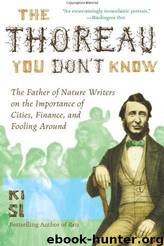The Thoreau You Don't Know: The Father of Nature Writers on the Importance of Cities, Finance, and Fooling Around by Robert Sullivan

Author:Robert Sullivan
Language: eng
Format: mobi
ISBN: 9780061710322
Publisher: Harper Perennial
Published: 2011-03-08T00:00:00+00:00
THE REVIEWER OF A WEEK who perhaps most upset him was Emerson. Emerson had praised the book to Thoreau in person. Eventually, Thoreau realized that Emerson was not being honest with him. “I had a friend, I wrote a book, I asked my friend’s criticism, I never got but praise for what was good in it—my friend became estranged from me and then I got blame for all that was bad,—& so I got at last the criticism which I wanted,” Thoreau wrote in his journal. In A Week, Thoreau had followed the precepts of “The American Scholar.” Now, Walden was going to be a different kind of book. A different kind of book required an end to the apprenticeship. Emerson, after all, liked the idea of a cabin, but thought Thoreau was taking the whole thing too far. Emerson was always telling Thoreau that life should be lived in that place between idealization and the limits of reality—what he called “the mid-world.” “Henry Thoreau is like the woodgod who solicits the wandering poet & draws him into antres vast & desarts idle, & bereaves him of his memory, & leaves him naked, plaiting vines & with twigs in his hand,” Emerson wrote in 1848 in his journal. “Very seductive are the first steps from the town to the woods, but the End is want & madness.” Thoreau went from being described by Emerson as “my valiant Henry Thoreau” or “my brave Henry” to a writer who confuses meanings, who purposefully luxuriates in opposites, things that upset Emerson but become the hallmark of Thoreau’s style.
Nevertheless, after living at the pond, Thoreau reported for duty back at Emerson’s house while Emerson embarked on his European tour. Thoreau’s time at the Emersons’ appears to have strained the relationship more. Emerson claimed to value his domestic life, and surely he did, and yet he went away to Europe on an extended trip when his wife’s health was frail, when his children were young. Emerson wrote depressing letters to his wife, even while she asked for more loving ones. “Well, I will come again shortly and behave the best I can,” he wrote. “Only I foresee plainly that the trick of solitariness never can leave me.”
Thoreau wrote privately of an unnamed woman whom Thoreau scholars presume to be Lidian. “I still think of you as my sister,” Thoreau wrote. “I presume to know you. Others are of my kindred by blood or of my acquaintance but you are mine. You are of me & I of you I can not tell where I leave off and you begin.—there is such a harmony when your sphere meets mine[.] To you I can afford to be forever what I am, for your presence will not permit me to be what I should not be.”
Obviously, Thoreau loved Lidian, and when he wrote letters to Emerson, he talked about Emerson’s family in a way that, even if it was well-meaning, had to sting. “Lidian and I make very good housekeepers,” Thoreau wrote.
Download
This site does not store any files on its server. We only index and link to content provided by other sites. Please contact the content providers to delete copyright contents if any and email us, we'll remove relevant links or contents immediately.
How to Do Nothing by Jenny Odell(3295)
A Forest Journey by John Perlin(3069)
The Plant Messiah by Carlos Magdalena(2927)
Babylon's Ark by Lawrence Anthony(2673)
The ESV Study Bible by Crossway Bibles(2550)
Energy Myths and Realities by Vaclav Smil(2488)
Fatal Storm by Rob Mundle(2214)
Abbey in America by Murray John A(2077)
Witness Tree by Lynda V. Mapes(1925)
Brokeback Mountain by Annie Proulx(1831)
Client Earth by James Thornton(1770)
Shadows on the Gulf by Rowan Jacobsen(1743)
Coming Back to Life by Joanna Macy(1717)
Cosmos by Carl Sagan(1715)
Water Rights and the Environment in the United States by John Burch(1683)
Mycelium Running: How Mushrooms Can Help Save the World by Paul Stamets(1682)
Ten Billion by Stephen Emmott(1652)
The overachievers by Robbins Alexandra(1576)
Ecological Intelligence by Daniel Goleman(1571)
